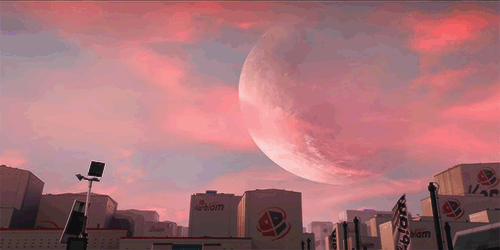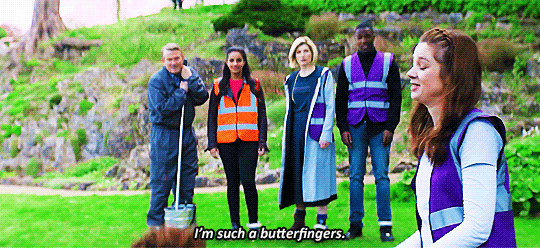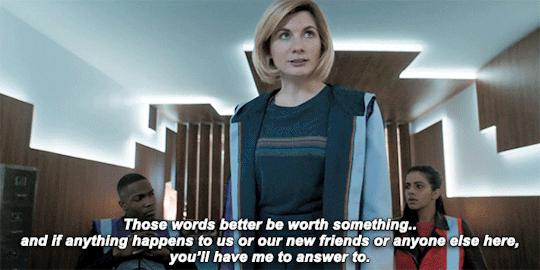This week on Doctor Who, the team visits Kandoka’s moon and find Kerb!am, the galaxy’s largest retailer to find the person that asked of their help. What they find is Space!Amazon and a terrorist trying to right capitalism’s wrongs in the worst way.
Moral of the story: does it have one?
Let’s start with the end of the episode since you shouldn’t be reading this anyway if you haven’t yet seen “Kerblam!”. Series 11 has been fairly political from the get-go, Arguably more so than previous seasons of DW. I for one have mostly appreciated these themes and arguments that the show was making, like the poignant “Rosa” episode or pointing out Trump 2.0′s faults in “Arachnids in the UK”. I wouldn’t say the season has been subtle about this and that certainly divided fans, but “Kerblam!” is the first instance when it feels particularly… clumsy.
So we have Kerblam, the largest retailer in the galaxy—basically Space!Amazon. The place is ominous from the start: not only does 90% of its workforce consists of robots but they also happen to be creepy ones and there’s a very real sense that the humans who do work there are being mistreated in some way or another. The expectation is that the robots will turn evil and the system will trap our heroes. Some guest characters will die, one of them will be behind it all, the Doctor and co. will end up taking the system down and reforming how Kandoka and the whole galaxy thinks about retail and human labour.
Part of me is grateful that there was a twist to the story. Tropes and formulas are not bad, but it also doesn’t hurt to shake things up a bit. The revelation that it was the Kerblam system itself that asked the Doctor for help was a surprise, at least for me. Charlie was a good villain because he genuinely believed he was doing the right thing and it was clear where he went wrong in his actions. By committing nonchalant murder, for one.
Yet the resolution seems like a hit-and-miss with fans because of how heavy-handed it was. So it’s not the system that was responsible or that humans have to be grateful for repetitive, mindless jobs. Charlie’s extremism is to blame in “Kerblam!”. But then how come that, despite the Doctor making it clear that murder and violence should never be the solution, Charlie’s plan still kind of worked? Judy and Slade promise to make improvements, including more jobs for humans, but doesn’t that validate Charlie’s terrorism? That plus the fact that Slade gets forgiven for his horrible treatment of Kira (and probably other workers) as soon as the Doctor realizes that he’s been investigating the disappearances.
After Charlie is revealed as the true antagonist, there’s no further criticism against Kerb!am or the people who benefit from its system. Space!Amazon would have been an easy target to criticise in this episode, maybe too easy in a way. But just because Charlie was in the wrong here, someone who blamed this system for the state humanity, doesn’t mean that Kerb!am had no other problems apart from its 10% quota. The conclusion lacked the nuance it really would have needed the drive the point home and encourage discussion about what the episode implies about Earth in the 21st century. Though “Kerblam!” did get people talking and a created a conversation, so that’s more than nothing. It’s just a shame that the episode failed to deliver when it really mattered.

Our new friends
The awkward handling of the conflict and implications aside, “Kerblam!” was a thoroughly enjoyable episode. The supporting cast played a huge part in this and I would as far as saying that this was the best cast of guest stars in the series so far, both the actors and their characters. Broadchurch alum Julie Hesmondhalgh stands out as she plays Judy, Head of People with an almost unnerving glee. Lee Mack’s Dan Cooper had a fun but short existence, but his sacrifice for Yaz will not be forgotten.
Guest characters getting a good introduction and then dying straight after reminds me of the RTD era. Not that Moffat didn’t have a body count but his characters almost always rose from the death or just weren’t remarkable enough to care about, so it’s a darkly nice change to have these memento moris scattered through episodes. Whittaker’s Doctor is fun and hugs but death is still part of adventures with the Doctor.
Speaking of death, there’s also poor Kira. She was by far the purest character of them all, her conversation with the Doctor and Ryan is simultaneously heartwarming and -breaking. Her death was even more upsetting than Dan’s since she was specifically targeted by Kerb!am to make Charlie understand pain. Not a classic case of fridging but not much if any better than Grace’s death, either. Kira deserved better.
Charlie himself was also a good character even considering the twist. It was because of the twist that we only had a few minutes with the real him and that contributed to the issue I mentioned above. He’s once again a human villain and one who wasn’t pure evil, though, again, it’s hard to decide how to feel about him. Terrorism = bad. The implication that Charlie wanting to change an unfair and exploitative system is inherently wrong = also bad. More time and a healthy dose of nuance might solved this, because Charlie himself was a sympathetic character up until the revelation. Alas, karmic death it is.

All in a day’s work for the fam
The one constant high every episode this season is Team TARDIS. Luckily they had a strong list of guests to interact with, but even without that the core four continue to carry any story. “Kerblam!” highlighted how well they work as a team but everyone also got their individuals moments of glory. It’s good to see that the three friends are starting to take initiative, having learnt from the Doctor. Graham knows exactly what to contribute as a maintenance man, Ryan uses his knowledge from his previous job and continues to overcome his dyspraxia, and Yasmin handled Charlie like the badass cop she is.
Graham got just a tiny bit extra to do in his relationship with Charlie. He’s clearly heartbroken when his new mate turns out to be a terrorist and pleads with the Doctor to give him another chance. Charlie ultimately dies and through that, we get just a hint of the Oncoming Storm in the Doctor. It’s not like she could have done much to save him but she kind of gave up on him as well. She tried to reason with him and failed, and in the end it was her choice to deal with the delivery robots in such a way that resulted in Charlie’s death.
If I’m starting to miss one thing from Jodie Whittaker’s Thirteenth Doctor, it’s a bit of darkness. She doesn’t have to be grumpy or “edgy” like some previous incarnation—of course not. In fact, I very much love how Whittaker plays the Doctor, with such energy, joy, and love. So far the only episode where she had a real sense of danger to her was “The Woman Who Fell to Earth” when she did her “I am the Doctor” speech. Not that we need one every episode, but every now and then it would be interesting to see another side to the Doctor. Maybe it will come to the surface during the season finale and when it does it will be that much more intense, who knows. Until then, I will continue to enjoy every moment we get of Thirteen.

Closing thoughts
After the first 10 minutes of “Kerblam!” I was sure this would be above “Arachnids in the UK” on my list, which currently stands as my third favourite episode of series 11. Now that I’ve seen the whole episode, I’m not so sure. I still enjoyed it quite a bit and the cast of characters definitely stands out as the best so far. The setting was interesting, the look of the show continues to be excellent and did like the writing. That clumsy way of handling the Charlie and Kerb!am conflict though.
There were other minor or not so minor things as well. When it’s revealed that Dan and the other workers have been liquefied, it’s quickly brushed aside as if it was just a mild inconvenience. I said dark but this is not what I meant. The overall handling of the workers was just as awkward as Charlie’s speech. Dan mentions that it’s the humans’ fault that they’re here because they were too busy with their phones—all this would have needed is the word “millennials”. We’re supposed to disagree with their treatment and the 10% quota and yet the Doctor only ever calls Slade out for his rudeness towards Kira. Feel sorry for the workers but also have a sense that humanity itself is responsible for this.
When it comes to more positive little things: Thirteen got the fez Eleven probably ordered, she remembers her adventure with Agatha Christie and Donna, and Yaz is allowed to be traumatized by Dan’s death. Oh, and bubble wrap! The monster of the week is bubble wrap. I count that as a positive because of how utterly ridiculous it is. And because it feels like a throwback to 70s Who when monsters were literally made out of bubble wrap. That, plus “Kerblam!” remains a fun episode despite its problems. And like I said, at least it got people talking, so maybe Doctor Who was never supposed to give us that nuance I missed form it. Maybe that comes from our own discussions about the episode.
Next week it’s back to the past and back to England in “The Witchfinders”. Is the Doctor going to be accused of witchcraft? Most certainly.

